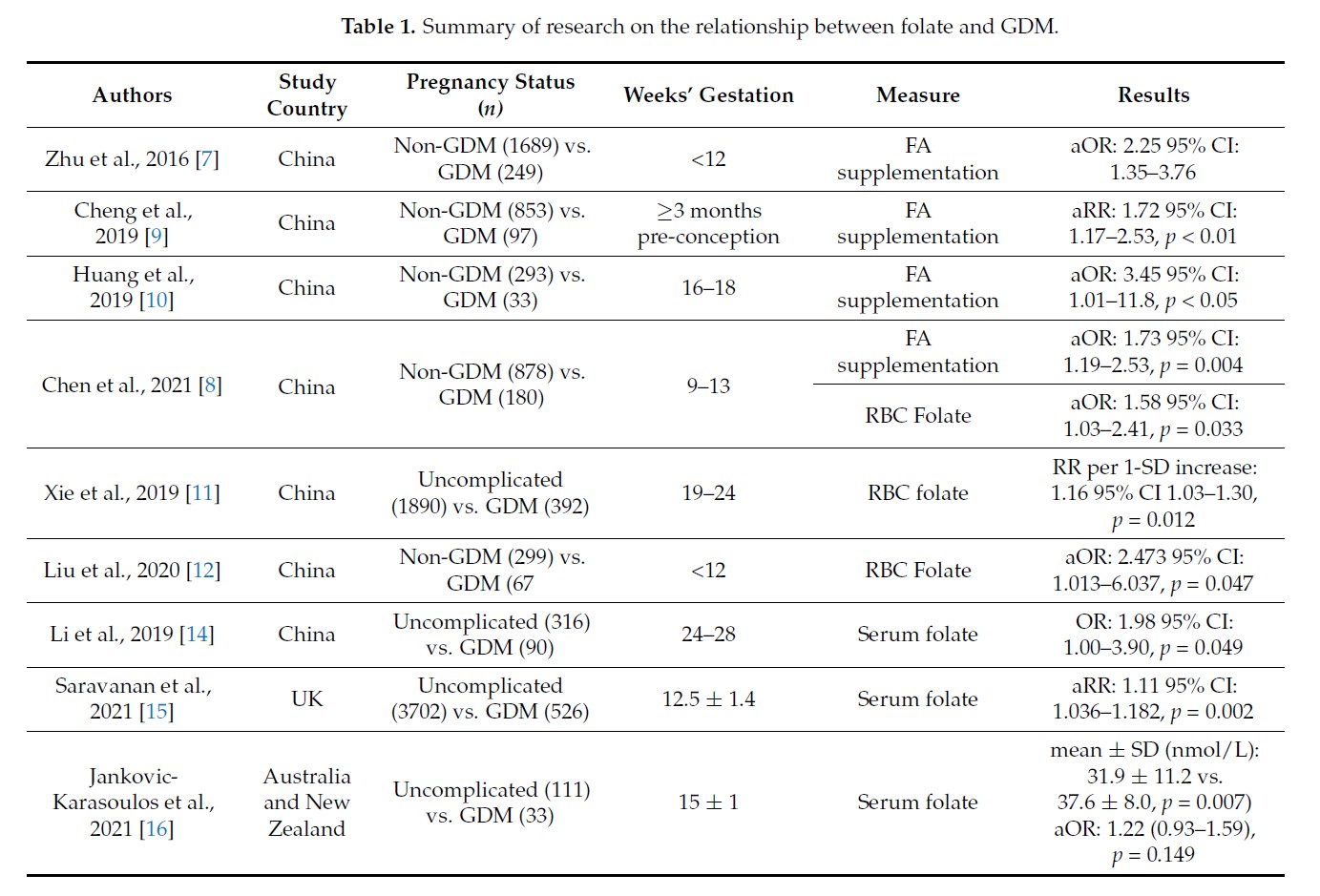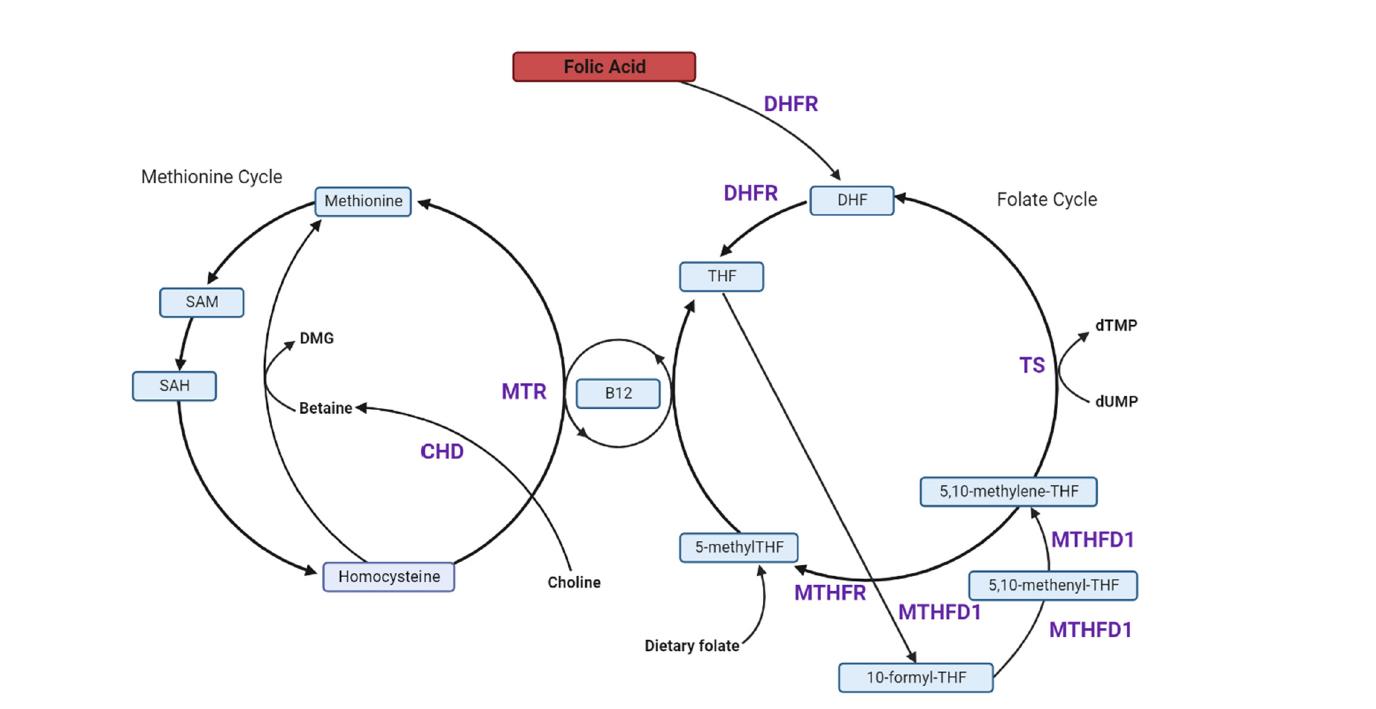Pregnancy is a critical time for ensuring the health of both mother and child, and folate plays a vital role. It's not just about supporting fetal development; folate also helps prevent neural tube defects and other congenital abnormalities. Yet, have you considered that the form of folate you choose could impact your health and even link to the risk of gestational diabetes (GDM)?
The Vital Role of Folate
Folate, also known as vitamin B9, is a water-soluble vitamin essential for our body's functions, including DNA synthesis, cell division, and protein metabolism. Prenatal folic acid supplementation is advised to prevent neural tube defects and congenital heart disease, which is why doctors recommend starting this supplementation before conception and continuing into early pregnancy.

Folic Acid vs. 6S-5-Methyltetrahydrofolate
The predominant form of folate supplementation in the market is synthetic folic acid (FA), a stable compound used in supplements and fortified foods. However, recent studies suggest that excessive synthetic folic acid intake could lead to the accumulation of unmetabolized folic acid (UMFA) in the blood, potentially increasing the risk of gestational diabetes.

Research indicates that high levels of synthetic folic acid can inhibit the activity of methylenetetrahydrofolate reductase (MTHFR), disrupting one-carbon metabolism and homocysteine (HCY) metabolism. As MTHFR is a key enzyme in folic acid metabolism, its reduced activity can elevate homocysteine levels, which are associated with oxidative stress, apoptosis, and insulin resistance—key risk factors for gestational diabetes.

The Benefits of 6S-5-Methyltetrahydrofolate
6S-5-Methyltetrahydrofolate is the end product of folic acid metabolism within the body, readily absorbed and constituting over 98% of our body's folic acid. Unlike synthetic folic acid, which requires conversion by dihydrofolate reductase (DHFR) and 5,10-methylenetetrahydrofolate reductase (MTHFR), 6S-5-Methyltetrahydrofolate (5-MTHF) offers the significant advantage of direct absorption without the need for metabolic conversion. Additionally, it participates in homocysteine metabolism, helping to lower homocysteine levels and prevent cardiovascular diseases.

Conclusion
Choosing the right form of folate supplementation is crucial for the health of both you and your baby. While synthetic folic acid is widely used, considering its potential risks for gestational diabetes, 5-methyltetrahydrofolate may be a safer and more effective alternative.
Especially noteworthy is naturalization folate (Magnafolate), which is produced without harmful substances like formaldehyde and p-toluenesulfonic acid, and strictly JK12A and 5-Methyltetrahydropteroic acid impurities, ensuring a virtually non-toxic level. It can rapidly elevate serum and red blood cell folic acid levels, making it a more suitable source of active folate for mothers and babies.

Proper nutritional supplementation is key to a healthy pregnancy. Let's strive together for a healthy gestation period!
References:
1. Williamson, J.M.; Arthurs, A.L.; Smith, M.D.; Roberts, C.T.; Jankovic-Karasoulos, T. High Folate, Perturbed One-Carbon Metabolism and Gestational Diabetes Mellitus. Nutrients 2022, 14, 3930.
2. Wang Shuowen, Zhang Qizong, Zhang Ting, Wang Li. Research Progress on 5-Methyltetrahydrofolate in Preventing Folic Acid Deficiency. International Journal of Pediatrics, 2020, 47(10): 723-726.
3. Pietrzik K, Bailey L, Shane B. Folic Acid and L-5-Methyltetrahydrofolate: Comparison of Clinical Pharmacokinetics and Pharmacodynamics. Clin Pharmacokinet. 2010;49(8):535-548.
4. Lian Zenglin, Liu Kang, Gu Jinhua, Cheng Yongzhi, et al. Biological Characteristics and Applications of Folic Acid and 5-Methyltetrahydrofolate. China Food Additives, 2022, Issue 2.
#L-Methylfolate#5-MTHF#folate#
L-5-methyltetrahydrofolate calcium#SSW#Magnafolate#151533-22-1#active folate#HCY#:
Homocysteine# Preeclampsia# Gestational Hypertension # PIH #Preeclampsia#
Pregnancy-Induced Hypertension# #Preeclampsia# Pre-eclampsia# Gestational
Diabetes Mellitus# Gestational Diabetes

 Español
Español Português
Português  русский
русский  Français
Français  日本語
日本語  Deutsch
Deutsch  tiếng Việt
tiếng Việt  Italiano
Italiano  Nederlands
Nederlands  ภาษาไทย
ภาษาไทย  Polski
Polski  한국어
한국어  Svenska
Svenska  magyar
magyar  Malay
Malay  বাংলা ভাষার
বাংলা ভাষার  Dansk
Dansk  Suomi
Suomi  हिन्दी
हिन्दी  Pilipino
Pilipino  Türkçe
Türkçe  Gaeilge
Gaeilge  العربية
العربية  Indonesia
Indonesia  Norsk
Norsk  تمل
تمل  český
český  ελληνικά
ελληνικά  український
український  Javanese
Javanese  فارسی
فارسی  தமிழ்
தமிழ்  తెలుగు
తెలుగు  नेपाली
नेपाली  Burmese
Burmese  български
български  ລາວ
ລາວ  Latine
Latine  Қазақша
Қазақша  Euskal
Euskal  Azərbaycan
Azərbaycan  Slovenský jazyk
Slovenský jazyk  Македонски
Македонски  Lietuvos
Lietuvos  Eesti Keel
Eesti Keel  Română
Română  Slovenski
Slovenski  मराठी
मराठी  Srpski језик
Srpski језик 








 Online Service
Online Service